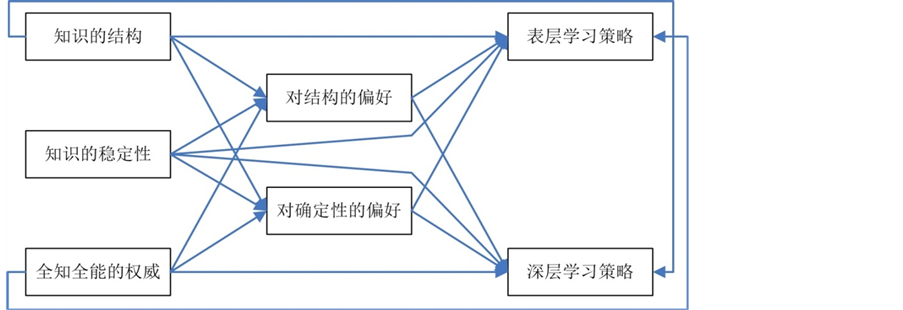1. 引言
学习策略是学生体验和应对学习情境的方式(Entwistle, McCune, & Walker, 2001)。不同研究者对学习策略提出了不同的理解。如,Entwistle(1997)研究学习策略时,将其分为深层学习、表层学习和策略性学习。Biggs等(1987, 2001)研究学习方式时,将其分为深层学习方式、表层学习方式以及成就式学习方式。上述对学习策略或方式的分析在理论基础、结构以及应用层次等方面虽然存在差异,但均区分了两种基本的并具有显著差异的学习策略:深层学习策略和表层学习策略。深层学习策略是一种寻求理解信息、知识深层含义及意义的学习,学习者对所学知识进行批判和反思、整合新旧知识;表层学习策略是一种信息复制性的学习,学习者通过机械地复述或背诵达到记忆信息或知识的目的(Rodriguez & Cano, 2007)。
认识论信念是近年教育心理学的研究热点之一(Muis, 2004; Phan, 2009)。DeBacker和Crowson(2006)提出,认识论领域的认识论信念和认知动机,如认知闭合需要,作为不易受情境影响的个体变量可能直接或间接影响学生的学习策略。关于认识论信念,不同研究者提出了各自关于知识的本质以及知识获得的理论模型,如Schommer(1990)的多维度认识论信念系统、Hofer和Pintrich(1997)关于认识论理论的观点以及Hammer和Elby(2002)提出的认识论资源的观点等等。认识论理论试图探讨个人理论的发展模式,但对学习因素信念的思考较为缺乏;认识论资源则强调实际情境对认识论资源的激活,情境性较强;Schommer的多维度信念系统在探讨个人认识论信念的结构及各维度发展规律的同时,也探讨个人认识论信念和个体学习以及其它心理因素之间的关系。因此,研究中对认识论信念的探讨基于Schommer(1990)提出的认识论信念的多维度信念系统。
Schommer(1990, 1994)提出认识论信念是一个由多种信念组成的多维度信念系统,各个信念既相互独立又有内在的联系;同时各信念都可以被视作一个由不成熟倾向和成熟倾向连成的连续体。认识论信念的多维度系统包括五个维度:知识的稳定性(知识是确定不变的——知识是暂定可变动的且具有情境性)、知识的结构(知识是孤立零散的事实——知识是相互关联、整合的信息)、学习的速度(学习是一蹴而就的、否则永远学不会——学习是一个循序渐进的过程)、学习的能力(学习能力是天生的并且无法改变——个体能够习得并发展学习能力)以及全知全能的权威(知识从外部权威处获得——知识是个体通过经验、推理获得的)(Schommer, 1990)。为了检验认识论信念的多维度性,Schommer(1990)以五维度的认识论信念为理论框架,编制了认识论信念问卷(Schommer Epistemological Questionnaire, SEQ)。Schommer的研究工作启迪了许多研究者开始关注认识论信念,特别是其与个体学习之间的关系(Clarebout, Elen, Luyten, & Bamps, 2001; Hofer, 2000, 2001)。虽然有研究发现在不同的文化背景或在不同的学科领域中,认识论信念系统的维度存在差异(Chan & Elliott, 2002; Hofer, 2000; Phan, 2008)。但大量应用SEQ测量个体认识论信念的研究也都表明,SEQ仍然是测量个体认识论信念最为普遍的研究工具(Metallidou, 2013)。总而言之,该模型的五维度结构是理解认识论信念的较完备的理论框架。
关于认识论信念与学习策略的关系,国外研究揭示,学生的认识论信念对学习策略具有重要影响(Cano, 2005; Chan, 2003; Kizilgunes, Tekkaya, & Sungur, 2009; Ozkal, Tekkaya, Cakiroglu, & Sungur, 2009; Phan, 2008, 2009)。如,Chan(2003)发现,能力固定性和表层学习策略正相关;全知全能的权威和表层学习策略正相关,和深层学习策略负相关;知识的稳定性和表层学习策略正相关。也有研究发现,知识的稳定性、学习的速度不影响学习策略(Dahl, Bals, & Turi, 2005)。国内关于认识论信念的研究起步较晚,测量中学生认识论信念的研究工具多根据Schommer(1990)的认识论信念量表改编而成。如,王婷婷和沈列敏(2007)编制了适用于我国高中生的认识论信念测量工具,以及桑青松和夏萌(2010)用于测量中学生认识论信念的问卷。
认知闭合需要指个体应对模糊性时的动机和愿望,它是“给问题找到一个明确答案的愿望,——无论是什么样的答案,——因为相对于混乱和不确定,任何明确的答案都更好些”(Kruglanski,1989;引自刘雪峰,张志学,2009)。社会及人格心理学领域关于认知闭合需要的研究较为成熟,研究结果支持认知闭合需要对个体解决问题的认知过程产生影响(Kruglanski & Webster, 1996; Richter & Kruglanski, 1998)。如,高认知闭合需要个体的定势思维的倾向性更强(Dijksterhuis, Van Knippenberg, Kruglanski, & Schaper, 1996)并依赖认知捷径进行社会判断(Kruglanski & Webster, 1996)。高认知闭合需要可能通过强化首因效应和近因效应而不利于学生的学习(Richter & Kruglanski, 1998)。
基于认知闭合需要是一种追求结构化、简化复杂信息以及回避模糊性的动机倾向(Kruglanski & Webster, 1996),DeBacker和Crowson(2009)提出认知闭合需要与学生的课堂学习相关,特别是对于经常遇到复杂的、不明确的或者存在争议的知识的中学生而言。为了探究学生的认知闭合需要水平是否会影响学习策略,DeBacker等(2008)编制了适用于测量课堂情境中学生认知闭合需要水平的学习观量表(Opinions about Learning and Studying, OLS),包括对结构的偏好和对确定性的偏好两个维度。对结构的偏好指学生对秩序井然并且具有可预知性的课堂的需要,涉及课堂的整体结构特征;对确定性的偏好指学生对确定答案的需要以及回避模糊性的需要,涉及学生所学课程的内容(DeBacker & Crowson, 2008)。基于学习观量表,DeBacker和Crowson(2008)发现对结构的偏好和深层学习策略、表层学习策略均呈正相关,对确定性的偏好和深层学习策略负相关;Harlow等(2011)进一步研究发现,对结构的偏好显著正向预测表层学习策略,对确定性的偏好显著负向预测深层学习策略。
在认识论信念和学习策略关系的研究中,国外学者发现,成就目标(Phan, 2009)和自我效能感(Kizilgunes, Tekkaya, & Sungur, 2009)等动机变量在认知论信念对学习策略的影响中发挥中介作用。那么是否认识论信念还通过其它变量间接影响学习策略,如,本质同样为动机的认知闭合需(刘雪峰,张志学,2009)?DeBacker和Crowson(2008)指出,认识论信念和认识闭合需要之间存在某种关系,二者之间的相关可能反映了学生不成熟的认识论信念造成其在课堂情境中体验到高水平的认知闭合需要,即课堂认知闭合需要。对结构的偏好和对确定性的偏好与认识论信念中学习的速度、知识的结构显著正相关;对确定性的偏好还与认识论信念中学习的能力以及知识的稳定性显著正相关。上述研究在某种程度上为课堂认知闭合需要在认识论信念和学生学习策略关系间可能的中介作用提供了支持。
目前,认识论信念和课堂认知闭合需要的相关研究不多,且尚未有研究同时探讨认识论信念和课堂认知闭合需要与学习策略的关系,特别是认识论信念是否借助课堂认知闭合需要影响学习策略。因此,基于已有文献以及对认知论信念和课堂认知闭合需要的认识,研究探讨认识论信念和课堂认知闭合需要对学习策略的影响,特别是课堂认知闭合需要在认识论信念和学习策略关系间可能发挥的中介作用。研究假设:1) 知识的结构、知识的稳定性、全知全能的权威分别正向预测表层学习策略;知识的结构、知识的稳定性、全知全能的权威分别负向预测深层学习策略。2) 对结构的偏好正向预测深层学习策略以及表层学习策略;对确定性的偏好负向预测深层学习策略,正向预测表层学习策略。3) 知识的结构、知识的稳定性、全知全能的权威分别通过对结构的偏好、对确定性的偏好间接影响表层学习策略、深层学习策略。图1为所提出的理论模型,该模型假设,认识论信念既直接影响学习策略,也通过课堂认知闭合需要间接影响学习策略。
2. 方法
2.1. 被试
采用便利性取样,在辽宁某所中学调查了250名高二学生的课堂认知闭合需要、成就目标和学习策略,获得有效问卷213份,问卷回收有效率为85.2%。213名研究对象年龄在15~20岁(M = 17.8,SD = 0.62),其中男生106名,女生107名。
2.2. 研究工具
1) 认识论信念问卷(Schommer Epistemological Questionnaire, SEQ)。知识的稳定性、知识的结构以及全知全能的权威三种信念量表明确反映了个体对知识以及知识获得所持有的信念,可代表个体的认识论信念。而学习的速度和学习的能力两种信念并非明确的并具有跨情境性的认知论信念,二者可能与个体对学习情境的不同理解有关(DeBacker & Crowson, 2006)。参鉴国内学者对中学生认识论信念的研究(王婷婷,沈列敏,2007;桑青松,夏萌,2010)以及Schommer(1990)编制的认识论信念五维度量表,研究用于测量认识论信念的量表摘自Schommer(1990)编制的量表,包括知识的稳定性(5题)、知识的结构(6题)以及全知全能的权威(5题)三个维度(陈育焕,2010),共16个项目,采用七点计分,1代表“完全不符合我”,7代表“完全符合我”,各维度的分数越高,说明个体的认识论信念越不成熟。如,学生在知识的稳定性这一维度得分越高,表明其越相信知识是确定不变的,具有固定性。
关于该问卷的结构效度,研究对以知识的结构、知识的确定性以及全知全能的权威为一阶因子,认识论信念为二阶因子的模型进行了验证性因素分析,模型拟合指数为:χ2/df = 1.22,RMSEA = 0.03,CFI = 0.98,NNFI = 0.98。可见,模型与样本数据的拟合是理想的,问卷所测量的知识的结构、知识的稳定性以及全知全能的权威能够表征学生对知识的本质以及知识的获得所持有的观念。该问卷的信度分析显示,知识的结构、知识的稳定性以及全知全能的权威三个分量表内部一致性系数分别为0.62,0.60和0.67,与已有研究结果一致,即测量认识论信念的研究工具其信度在0.57~0.76左右(陈荻卿,张景媛,2007)。这可能与个人对知识和学习的理解具有复杂性和多面性有关。
2) 学习观问卷(Opinions about Learning and Studying, OLS) (DeBacker & Crowson, 2008)。OLS包括对结构的偏好(18题)和对确定性的偏好(10题)两个子问卷。已有研究显示该问卷具有可接受的信效度,对结构的偏好的Cronbach’s α系数为0.83,对确定性的偏好的Cronbach’s α系数为0.79;OLS二因素模型的验证性因素分析模型拟合指数为CFI = 0.98,NNFI = 0.95,RMSEA = 0.065。原问卷是针对美国学生设计,笔者按照中国人用语习惯对该问卷进行了翻译和回译。问卷使用7级计分,1代表“完全不符合我”,7代表“完全符合我”。对结构的偏好例题为“我喜欢老师按照教学大纲进行教学”,对确定性的偏好例题为“我不喜欢做需要从问题的不同角度进行回答的作业”。研究中分别对两个子问卷进行验证性因

Figure 1. The hypothesized model of the mediatory role of need for closure between epistemological belief and learning strategy
图1. 认识论信念、课堂认知闭合需要和学习策略的假设模型
素分析,结果表明,对结构的偏好的模型拟合指数为:χ /df = 1.88,RMASE = 0.06,NNFI = 0.90,CFI = 0.92;对确定性的偏好的模型拟合指数为:χ2/df = 1.23,RMASE = 0.03,NNFI = 0.94,CFI = 0.95。此外,对结构的偏好的Cronbach’s α系数为0.77,对确定性的偏好的Cronbach’s α系数为0.60。上述数据表明,该问卷具有令人满意的信效度,可以用于测量中国高中生的认知闭合需要。
3) 学习策略问卷。本问卷来自Duncan和McKeachie(2005)编制的学习动机策略问卷(Motivated Strategies for Learning Questionnaire,MLSQ)(陈松,2011),包括深层学习策略和表层学习策略两个子问卷。深层学习策略由6题组成,测量批判性思维等,如,“学习时,我会联系自己碰到的问题,对理论进行思考和质疑”;表层学习策略由5题组成,测量记忆或背诵等,如,“考试之前,我总是尽可能地记忆知识”。深层学习策略和表层学习策略的Cronbach’s α系数在已有的研究中分别为0.78和0.76(陈松,2011)。研究中该问卷采用7级计分,1代表“完全不符合我”,7代表“完全符合我”。分别对两个子问卷进行验证性因素分析,结果表明,表层学习策略的模型拟合指数为:χ2/df = 1.69,RMASE = 0.06,NNFI = 0.98,CFI = 0.99;深层学习策略的模型拟合指数为:χ2/df = 2.23,RMASE = 0.08,NNFI = 0.93,CFI = 0.96。表层学习策略的Cronbach’s α系数为0.66,深层学习策略的Cronbach’s α系数为0.72。
2.3. 实施过程
在任课老师的协助下,以班级为单位对5个班级的学生进行集体施测,在调查的同时获得高中生性别、年龄等人口学信息。整个施测过程大约持续15分钟,所有被试均在知情同意前提下参与了本问卷填答。对收集到的有效问卷运用SPSS17.0进行了数据录入和整理工作;认识论信念、课堂认知闭合需要以及学习策略问卷的结构效度借助LISREL8.70进行了验证性因素分析;同时,借助AMOS17.0研究认识论信念、课堂认知闭合需要和学习策略之间的关系。
3. 结果
3.1. 认识论信念、课堂认知闭合需要和学习策略的相关分析
由表1的零阶相关矩阵可知,认识论信念(知识的结构、知识的稳定性以及全知全能的权威)和课堂认知闭合需要(对结构的偏好、对确定性的偏好)均和表层学习策略显著正相关;知识的稳定性、对结构的偏好和深层学习策略显著正相关,全知全能的权威、对确定性的偏好和深层学习策略显著负相关,知识的结构与深层学习策略的负相关不显著。同时,知识的结构、知识的稳定性以及全知全能的权威分别和对结构的偏好、对确定性的偏好显著正相关。

Table 1. Means, standard deviations, correlations among variables
表1. 认识论信念、课堂认知闭合需要和学习策略的零阶相关矩阵
*p < 0.05; **p < 0.01; ***p < 0.001.
3.2. 认识论信念对课堂认知闭合需要和学习策略的预测
对研究所提出的理论模型与数据的拟合情况进行初步检验,并根据模型修正指数、对研究变量关系的理论思考以及相关研究结果(Harlow, DeBacker, & Crowson, 2011; Ravindran, Greene, & Debacker, 2005),对模型进行了逐步修正1,修正后的模型检验的结果如下:χ2/df = 1.91,RMSEA = 0.07,NNFI = 0.95,CFI = 0.99(见图2)。对照相关模型拟合参数(温忠麟,侯杰泰,马什赫伯特,2004),模型和样本数据拟合较好。
由图2可知,认识论信念以及课堂认知闭合需要共解释了表层学习策略21%的变异,其中,认识论信念对表层学习策略没有显著的直接影响;课堂认知闭合需要中对结构的偏好(β = 0.39)显著正向预测表层学习策略;知识的结构和知识的稳定性通过对结构的偏好间接正向预测表层学习。同时,认识论信念以及课堂认知闭合需要共解释了深层学习策略23%的变异,其中,知识的稳定性(β = 0.28),对结构的偏好(β = 0.37)显著正向预测深层学习策略;全知全能的权威(β = −0.33)和对确定性的偏好(β = −0.28)显著负向预测深层学习策略;知识的稳定性和全知全能的权威既直接影响又分别通过对结构的偏好(正向)和对确定性的偏好(负向)间接影响深层学习策略。
为了检验课堂认知闭合需要在认识论信念和学习策略关系间的中介效应的显著性,研究采用蒙特卡罗法(The Monte Carlo Method for Assessing Mediation, MCMAM) (Selig & Preacher, 2008)进行显著性分析。在原始数据(N = 213)中重复随机抽取1000个样本,并分析置信区间,如果路径系数95%的置信区间没有包括0,表明中介效应显著。如表2所示,知识的结构、知识的稳定性分别通过对结构的偏好影响表层学习策略和深层学习策略的路径,知识的结构通过对确定性的偏好影响深层学习策略的路径,其95%的置信区间都没有包括0,即,对结构的偏好在知识的结构、知识的稳定性和学习策略关系间的中介效应显著;对确定性的偏好在知识的结构和深层学习策略关系间的中介效应显著。具体而言,知识的结构通过正向预测对结构的偏好(β = 0.45)间接影响表层学习策略和深层学习策略,其间接效应分别为0.18和0.17;知识的结构通过正向预测对确定性的偏好(β = 0.46)间接影响深层学习策略,其间接效应为−0.13;

Figure 2. The path model depicting the mediating role of need for closure between epistemological belief and learning strategy
图2. 认识论信念、课堂认知闭合需要和学习策略关系的多重中介模型

Table 2. The MCMAN analyses of mediating model
表2. 对中介效应显著性检验的MCMAN分析
知识的稳定性通过正向预测对结构的偏好(β = 0.20)间接影响表层学习策略和深层学习策略,其间接效应分别为0.08和0.07。此外,研究发现,对确定性的偏好在全知全能的权威和深层学习策略关系间的中介效应并不显著。
4. 讨论
4.1. 认识论信念和课堂认知闭合需要对学习策略的预测
关于认识论信念直接影响学习策略的假设,研究发现,全知全能的权威显著负向预测深层学习策略,此结果与研究假设一致。学生越相信知识是从教师、专家或课本中获得的,其对以此获得的知识越深信不疑,越不倾向于对知识进行质疑,这就抑制了学生使用深层学习策略的倾向。相反,如果学生认为知识必须通过自己的推理、判断才能真正掌握,那么其使用深层学习策略的水平会较高。这与Chan(2003)的研究结果一致。
研究还发现,知识的稳定性显著正向预测深层学习策略,即当学生认为知识是持久稳定的,并不随着时空的转换而改变,其倾向于采纳有效的深层学习策略。这与研究的假设不一致,且不同于一些学者的研究结果(Cano, 2005; Chan, 2003; Ozkal et al., 2009)。Chan(2003)和Cano(2005)研究发现,知识的稳定性正向预测表层学习策略;Ozkal等(2009)提出,相信知识是暂时、可变的学生倾向于使用深层学习策略。然而,Chan(2003)也认为所处的具体情境不同,知识的稳定性可能正向预测表层学习策略也可能正向预测深层学习策略。
已有研究发现,文化可能影响个体认识论信念的形成和发展(Lin, Deng, Chai, & Tsai, 2013; Qian & Pan, 2002; Tsai, Jessie Ho, Liang, & Lin, 2011)。Qian和Pan(2002)对中美两国11和12年级学生的认识论信念进行比较研究,结果显示中国学生普遍认为知识是稳定不变的,是相互独立、离散的信息同时学习能力是天生的;美国学生则普遍认为知识的学习是快速而非循序渐进的。Lin等(2013)研究发现,认为知识是可变、暂时的中国学生其考试焦虑水平较高。还有学者(Qian & Pan, 2002; Tsai, Ho, Liang, & Lin, 2011)提出,在进行标准化测验时,相信知识不是稳定不变的学生较难获得优异的成绩。上述原因可以解释此研究结果,即受到以儒家学说为主流的传统社会文化环境的影响以及自入学以来考试标准化、答案标准化的影响,在学习过程中,中国学生会为了获得唯一的正确答案而付出自己的努力,如使用查阅相关资料,将新旧知识整合起来等深层学习策略。此外,研究的参与者为高中二年级学生,这一阶段他们最重要的任务是准备高考,而考试成绩的优异与否在于你是否解得正确答案,在以备战考试为目的的学习中,为获得正确答案,学生需要做到整合新旧知识、争取弄懂不理解的问题或对相关理论进行思考等,从而导致知识的稳定性正向预测深层学习策略。
关于课堂认知闭合需要与学习策略的关系,研究发现,对结构的偏好正向预测深层学习策略和表层学习策略,这与Harlow等(2011)的研究结果一致,即,对结构的偏好程度高的学生倾向于使用多样化的学习策略。Debacker和Crowson(2006)也曾提出,与对确定性的偏好相比,对结构的偏好更具适应性的特征——对结构的偏好可能与积极的学习行为、学习结果相关。研究结果还揭示,对确定性的偏好负向预测深层学习策略。深层学习策略通常需要个体从多方面提出各种假设,并仔细思考以及评价所提出的假设以期形成准确且相互联系的知识体系,但对确定性偏好强的学生而言,他们希望自己所学知识是确定无疑的、无争议的,因而不倾向于使用深层学习策略。
4.2. 课堂认知闭合需要在认识论信念对学习策略影响中的中介作用
关于认识论信念通过课堂认知闭合需要对学习策略产生间接影响,研究发现,知识的结构通过提高学生对确定性的偏好程度,降低其使用深层学习策略的水平。对于知识的结构这一认识论信念不成熟的学生而言,他们相信知识是离散的并非相互联系的,模棱两可的知识或有多种答案的作业等对于他们而言是复杂且难以理解的,同伴或教师对于所学知识的不同认识可能会使他们感到困惑,他们倾向于学习确定无疑的简单知识。因此这类学生对确定性偏好的水平较高,不喜欢学习或避免学习会让自己感到困惑的复杂知识,也不喜欢同伴或老师在课堂上畅所欲言。而深层学习策略则需要学生在学习过程中,质疑所学的知识或就任务从多方面提出各种假设,并通过查找更多的资料以佐证自己已获得的信息,以及将新获得信息与自己原有的知识结合起来。因此,深层学习策略不仅不能满足对确定性的偏好强的学生对于确定的、无争议的知识的需要,还可能引起其不安或焦虑的情绪。
研究还发现,知识的结构、知识的稳定性分别通过提高学生对结构的偏好的程度,促进学生深层学习策略、表层学习策略的使用水平。知识的结构这一认识论信念越不成熟,学生越相信知识是离散的而非整合的,因此越倾向于要求教师上课具有条理性并遵循教学大纲、课本进行教学,学生自己的课堂笔记也要有条理(对结构的偏好的特征)。与此同时,越相信自己所学的知识是真实可靠、可以受用一生的学生,其对结构的偏好程度越强,对教师遵循课本或大纲进行有条理教学的需求越高、并更加重视学习计划、对于学习任务或作业,学生也更希望获得详细的指导等。如果教师上课没有条理,或没有直接按照教学大纲进行教学,学生不会主动地将相关知识联系起来,这可能影响到学生对知识的接受和理解。而正如4.1分析所言,对结构的偏好既可正向预测深层学习策略,也可正向预测表层学习策略。
此外,研究结果没有支持认识论信念(知识的结构、知识的稳定性和全知全能的权威)直接正向预测表层学习策略。这与Cano(2005)揭示的知识的结构、知识的稳定性分别显著正向预测表层学习策略,Ravindran等(2005)发现的知识的结构正向预测表层认知投入的发现不一致;与Ravindran等(2005)研究所揭示的知识的稳定性、全知全能的权威无法预测表层认知投入一致。但相关分析揭示,知识的结构、知识的稳定性、全知全能的权威和表层学习策略均显著正相关。认识论信念是关于知识的本质以及知识获得的一般信念,对于参与本次研究的高中生而言,不成熟的认识论信念并非提高表层学习策略使用水平的直接因素,其可能通过激发个体在学习情境中的成就目标(Phan, 2009),自我效能感(Kizilgunes, Tekkaya, & Sungur, 2009)或对结构的偏好进而影响学生学习策略的使用。
研究结果对于当前中学生的学习、教师的教学具有一定的启发意义。培养学生积极、有效的学习策略,除了考虑已有研究所揭示的人格特征、成就目标、自我效能感等因素外,还需要考虑学生的认识论信念和作为动机的课堂认知闭合需要。第一,不成熟的认识论信念不利于学生使用深层学习策略,这要求教师注重培养学生对知识的本质以及学习的本质的深刻理解。值得注意的是,研究结果揭示,知识的稳定性这一认识论信念不成熟的学生反而倾向于使用深层学习策略,这也许受到中国文化以及当前教育环境的影响。鉴于本研究的参与对象仅为高中生,研究对象以及研究范围有限,今后的研究需进一步探讨、检验知识的稳定性对各年龄阶段学生学习过程和结果的影响。第二,研究结果揭示对结构的偏好这一课堂认知闭合需要有利于学生使用有效的学习策略,正如研究者(DeBacker & Crowson, 2006)所提出的,对结构的偏好这一课堂认知闭合需要是一种更具适应性的动机因素。教师、家长可以通过培养学生成熟的认识论信念来提高结构性偏好。在未来的研究中,需进一步探讨课堂环境特征对学生对确定性偏好以及结构性偏好的影响,进而促进学生使用深层学习策略。
5. 结论
研究结果表明,认识论信念既直接也通过课堂认知闭合需要间接影响学习策略。1) 知识的稳定性正向预测深层学习策略,全知全能的权威负向预测深层学习策略。2) 对结构的偏好正向预测表层学习策略以及深层学习策略;对确定性的偏好负向预测深层学习策略。3) 知识的结构、知识的稳定性分别通过对结构的偏好间接预测表层学习策略和深层学习策略;知识的结构通过对确定性的偏好间接预测深层学习策略。
基金项目
本研究获江苏省及南京师范大学研究生培养创新工程(CXLX13_344)基金资助。

NOTES
1独立样本t检验表明,男女生在认识论信念(知识的结构、知识的稳定性以及全知全能的权威)、课堂认知闭合需要(对结构的偏好、对确定性的偏好)以及深层学习策略上均不存在显著差异,性别差异只存在于表层学习策略上(t = 2.14, p < 0.05),女生比男生更倾向于采用表层学习策略。这一研究结果与Phan(2008)发现的太平洋地区中学生的认识论信念以及学习方式均不存在显著的性别差异,与Tȕmkaya(2012)的认识论信念不存在性别差异的结果基本一致。鉴于男女生在认识论信念、课堂认知闭合需要等因素上均不存在显著差异,在探讨认识论信念、课堂认知闭合需要和学习策略之间的关系时,并不对性别加以控制。